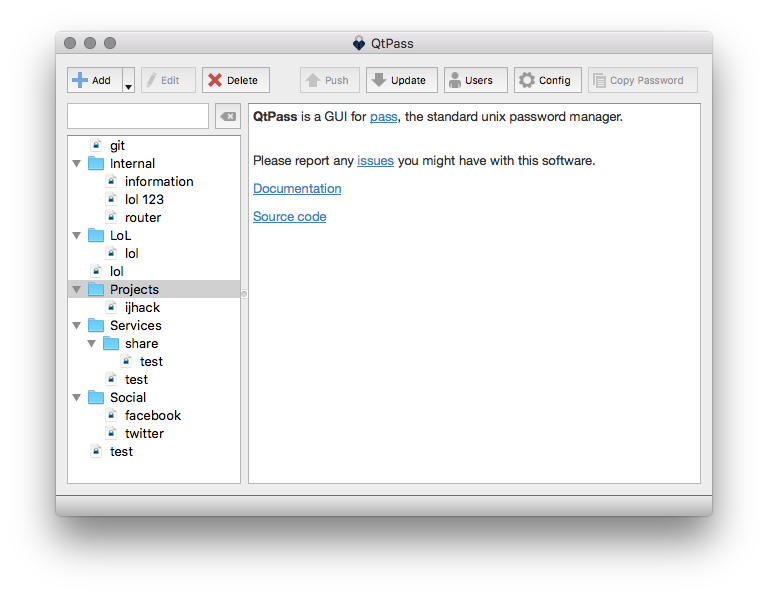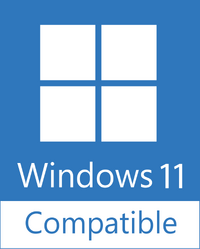QtPass 1.4.0
QtPass is a multi-platform GUI for pass, the standard unix password manager.
View the Project on GitHub IJHack/QtPass


GUI for pass, the standard UNIX password manager
QtPass is part of the pass ecosystem. This means you are not stuck with QtPass, you can use the same password store with many clients.
Password management should be simple and follow Unix philosophy. With pass, each password lives inside of a gpg encrypted file whose filename is the title of the website or resource that requires the password.
These encrypted files may be organized into meaningful folder hierarchies, copied from computer to computer, and, in general, manipulated using standard command line file management utilities.
Contrary to many Free, Libre and OpenSource password managers, pass and by extension QtPass are not bound to one user or device. Since we are based on GnuPG we have multi-key, multi recipient encryption out of the box. The use of external encryption devices like OpenPGP or x509/CMS based smartcards or USB tokens and per-folder ACL makes it easy to grant or take away privileges from users.
Insecure Password Generation prior to 1.2.1
All passwords generated with QtPass' built-in password generator prior to 1.2.1 are possibly predictable and enumerable by hackers.
The generator used libc's random(), seeded with srand(msecs), where msecs is not the
msecs since 1970 (not that that'd be secure anyway), but rather the
msecs since the last second. This means there are only 1000 different
sequences of generated passwords.
Read more about this issue on Github.
Please note that this is an issue with the QtPass GUI and not in pass or the greater password-store ecosystem.
We advice to update to 1.2.1 or later as soon as possible and change any password you may have generated with the QtPass' password generator.
Features
Read the changelog for the latest features and fixes.
- Using pass or git and gpg2 directly
- Cross platform: Linux, BSD, OS X and Windows
- Using native widgets and iconography where possible
- Reading pass password stores
- Decrypting and displaying the password and related info
- Editing and adding of passwords and information
- Updating to and from a git repository
- Per-folder user selection for multi recipient encryption
- Configuration options for backends and executable/folder locations
- Copying password to clipboard
- Configurable shoulder surfing protection options
- Easy onboarding for new users
- Experimental WebDAV support
- Much more
Installation
Linux
Arch
pacman -S qtpassOpenSUSE & Fedora
yum install qtpassdnf install qtpassDebian, Ubuntu and derivates like Kali & Raspbian
apt-get install qtpassGentoo
emerge -atv qtpassFreeBSD
pkg install qtpasscd /usr/ports/sysutils/qtpass/ && make install cleanMore options
Windows
Latest stable on the releases page, latest build via AppVeyor.
Via Chocolateychoco install qtpassOSX
Latest stable on the releases page, latest build via AnneJan.
Via Homebrew Caskbrew install qtpass --caskDependencies
- QtPass requires Qt 5.2 or later.
- The Linguist package is required to compile the translations.
- For use of the fallback icons the SVG library is required.
On most *nix systems all you need is:
qmake && make && make installOn Mac OS X:
brew install qt5
brew link --overwrite --force qt5
xcode-select --install
qmake && make && macdeployqt QtPass.appSecurity considerations
Using this program will not magically keep your passwords secure against compromised computers even if you use it in combination with a smartcard.
It does protect future and changed passwords though against anyone with access to your password store only but not your keys. Used with a smartcard it also protects against anyone just monitoring/copying all files/keystrokes on that machine and such an attacker would only gain access to the passwords you actually use. Once you plug in your smartcard and enter your PIN (or due to CVE-2015-3298 even without your PIN) all your passwords available to the machine can be decrypted by it, if there is malicious software targeted specifically against it installed (or at least one that knows how to use a smartcard).
To get better protection out of use with a smartcard even against a targeted attack I can think of at least two options:
- The smartcard must require explicit confirmation for each decryption operation. Or if it just provides a counter for decrypted data you could at least notice an attack afterwards, though at quite some effort on your part.
- Use a different smartcard for each (group of) key.
- If using a YubiKey or U2F module or similar that requires a "button" press for other authentication methods you can use one OTP/U2F enabled WebDAV account per password (or groups of passwords) as a quite inconvenient workaround. Unfortunately I do not know of any WebDAV service with OTP support except ownCloud (so you would have to run your own server).
Planned features
- Plugins based on key, format is same as password file.
- Colour coding folders (possibly disabling folders you can't decrypt).
- Optional table view of decrypted folder contents.
- Opening of (basic auth) urls in default browser? Possibly with helper plugin for filling out forms?
- WebDAV (configuration) support.
- Other forms of remote storage that allows for accountability / auditing (web API to retreive the .gpg files)?
- Refactoring MainWindow class.
Known issues
- Filtering (searching) breaks the tree/model sometimes.
FAQ
Can't save a password
- Is folder initialised? Easiest way is to use the [Users] button and make sure you can encrypt for someone (eg. yourself)
- Are you using git? If not, make sure it is switched off.
I have an issue with GNOME keyring
- Disable GNOME keyring
- Create a
~/.gnupg/gpg-agent.confcontaining:
enable-ssh-support
write-env-file
use-standard-socket
default-cache-ttl 600
max-cache-ttl 7200Also, the following is useful to add to your .bashrc if you are using Yubikey NEO on Ubuntu:
# OpenPGP applet support for YubiKey NEO
if [ ! -f /tmp/gpg-agent.env ]; then
killall gpg-agent;
eval $(gpg-agent --daemon --enable-ssh-support > /tmp/gpg-agent.env);
fi
. /tmp/gpg-agent.envCan I import from KeePass, LastPass or X?
- Yes, check passwordstore.org/#migration for more info.
Are there more frequently asked questions?
- Read the current QtPass FAQ and documentation on contributing.
- Read the whitepaper (pdf).
Where can I ask for help?
- Create an issue issues on github.
- Send an email to help@qtpass.org



